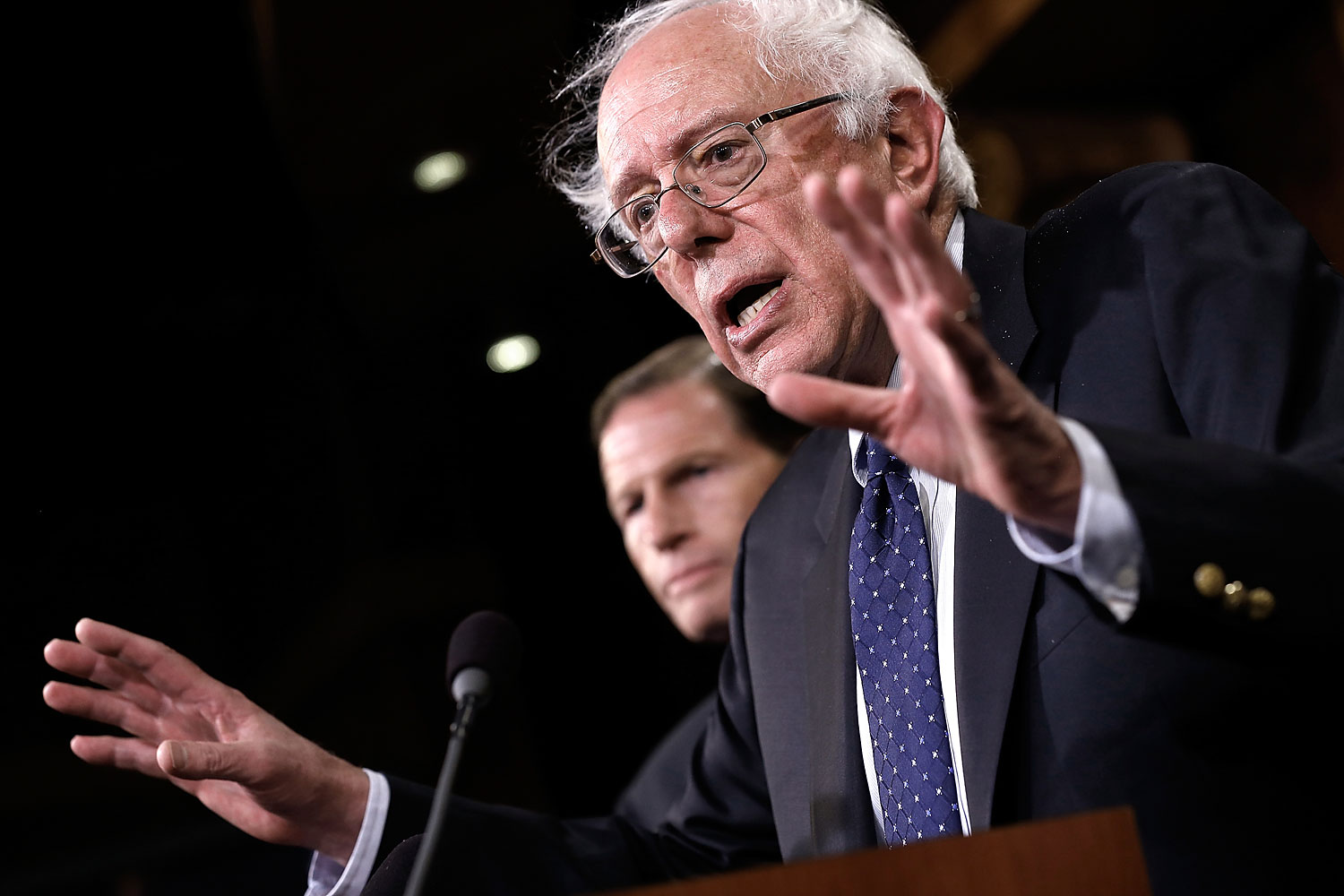
The political philosophy of Vermont Sen. Bernie Sanders is not wanting for boogeymen. He sees them everywhere, overrunning Washington, distorting democracy, beating down the working family. It’s hard to go more than a few minutes into conversation before he begins to list them off. “People with incredible wealth and power,” he says. “The pharmaceutical industry, the insurance industry, Wall Street, the military industrial complex.”
His great regret of Barack Obama is that the President never stood up like Franklin Delano Roosevelt did in 1936 to denounce the “economic royalists” of finance and industry, to “welcome their hatred.” “Point the finger at the billionaire class to say, ‘You know what, they hate my guts, the Koch brothers hate me, it’s all right. But I’m with you, and this is what we’re going to do,’ ” Sanders says.
In that shift from Roosevelt’s “economic royalists” to Sanders’ “billionaire class” lie the seeds of a nascent “class-based” presidential campaign that Sanders says he may unfurl as early as March. He has been traveling to New Hampshire and Iowa—”a beautiful state,” he says of the latter—while making the rounds on television news. He has drawn up a 12-step “Economic Agenda for America”—No. 9, not surprisingly, is “Taking on Wall Street”—and deliberating upon the best way to highlight the inequities that threaten the American experiment, so as to spark a grassroots brushfire.
During an hour-long visit to TIME’s Washington Bureau on Thursday, the junior Senator from Vermont, self-described “Democratic socialist” and incoming ranking member of the Senate Budget Committee laid out his vision for a presidential campaign, with all the requisite qualifications since he has yet to make a final decision on running.
If he takes the dive, the political independent who caucuses with Democrats will not spare his adopted party, a fact that is sure to cause headaches for the current heir to the liberal crown, Hillary Clinton. “People see the Democratic Party, which really once was the party of the American working class, really isn’t anymore,” he says. “They have over the years supported trade agreements from corporate America. They have not been vigorous in standing up for the kind of tax system that we need. They have not been vigorous enough in fighting for the kind of jobs programs that we need.” There is more: The deregulation of Wall Street under President Clinton’s Treasury Secretary Robert Rubin—”not a Republican,” notes Sanders. The too-small 2009 stimulus of Obama after the great recession. The hesitancy of so many in the party to declare healthcare a basic American right.
That said, he claims no interest in running a campaign that does not yield a large number of votes. He has run and lost protest campaigns before, but to do so now would risk marginalizing his own views. “If we don’t have a good campaign … it’s not just my ego that is hurt,” he says.
He has also not yet decided whether to mount a frontal assault on Hillary Clinton’s likely quest for the Democratic nomination, the most likely route to a consequential campaign. “I have not yet made the decision of whether to run as an independent or within the Democratic primary system,” he cautions, before noting that it is almost impossible for an independent to get on the ballot in states such as North Carolina. “But what I will not do is to create a situation where we elect a right-wing Republican as president.”
And how will he deal with campaign-finance system that increasing favors the candidate with the richest friends? He also says he sees no need to disarm by demanding his supporters eschew unlimited checks to SuperPACs, the big-spending political vehicles of the billionaires he decries. “When I am walking into a campaign where I will be outspent 50 to one, should the first thing that I do be to say I should be outspent 100-to-one?” he asks, rhetorically.
Asked about the familiar last names of the likely frontrunners, he agrees that the Bush and Clinton dynasties raise important issues for the country. “It’s an issue. How dynamic and vital is our American democracy? ” he asks. ” If your dad, or your husband in Hillary’s case, or your father in Jeb Bush’s case, or his brother, has a name that is nationally famous, you start off with a certain name advantage.”
Sanders’ dad sold paint in Brooklyn, and in Sanders’ last statewide campaign he raised only $7 million, about what the 2012 Obama campaign spent in a week during the 2012 election. But a true populist does not let odds get in his way. To quote FDR again, “The resolute enemy within our gates is ever ready to beat down our words unless in greater courage we will fight for them.” So Sanders, his hair always mussed, his Brooklyn accent unfaded, faces a choice, to fight on with his hat in the ring or from the safety of the Senate floor.
More Must-Reads from TIME
- Donald Trump Is TIME's 2024 Person of the Year
- Why We Chose Trump as Person of the Year
- Is Intermittent Fasting Good or Bad for You?
- The 100 Must-Read Books of 2024
- The 20 Best Christmas TV Episodes
- Column: If Optimism Feels Ridiculous Now, Try Hope
- The Future of Climate Action Is Trade Policy
- Merle Bombardieri Is Helping People Make the Baby Decision
Contact us at letters@time.com